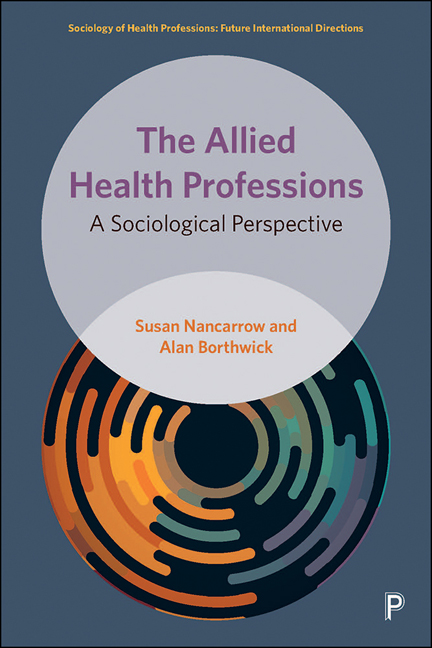Book contents
- Frontmatter
- Contents
- List of abbreviations
- Acknowledgements
- Editors’ overview
- Introduction
- 1 The allied health collective
- 2 Diversity in the allied health professions
- 3 The established allied health professions
- 4 Emerging allied health professions
- 5 The support workforce within the allied health division of labour
- 6 Specialisation in allied health
- 7 Post-professionalism and allied health
- Conclusion
- References
- Index
6 - Specialisation in allied health
Published online by Cambridge University Press: 05 January 2022
- Frontmatter
- Contents
- List of abbreviations
- Acknowledgements
- Editors’ overview
- Introduction
- 1 The allied health collective
- 2 Diversity in the allied health professions
- 3 The established allied health professions
- 4 Emerging allied health professions
- 5 The support workforce within the allied health division of labour
- 6 Specialisation in allied health
- 7 Post-professionalism and allied health
- Conclusion
- References
- Index
Summary
There are several allied health professions that may be regarded as ‘mature’, in the sense that they have become an established part of mainstream health service provision, been recognised by the state and have a voice at policy level (Larkin, 1983; Hugman, 1991; Witz, 1992). Within that broad definition, they are also marked by a structure characterised by internal divisions recognised as specialisms within the discipline, demanding further forms of education, training and credentialing beyond baseline registration requirements (Hugman, 1991). Largely, these specialist fields of practice comprise roles with higher-level skills and knowledge, and thus attract a greater degree of prestige and, commonly, better remuneration (Hugman, 1991; Borthwick, 2000). While many of the long-standing allied health professions possess some types of internally recognised speciality forms of practice, relatively few enjoy state recognition in the guise of separate regulatory provisions or legislation. However, state health policies aimed at workforce flexibility have led to new opportunities for allied health professions to secure formal recognition for roles that were previously exclusive to the medical profession.
A discussion of the pursuit of specialisation for physiotherapists in Australia sheds light on some of the challenges faced by allied health professions as they seek to develop their own recognised specialisms (Bennett and Grant, 2004). In particular, the specialist areas need to be: recognised by peers and external agencies; associated with a career structure for clinicians; and associated with a commensurate remuneration and reward structure. Interestingly, the Physiotherapy Board of New Zealand (2020) endorses and regulates a range of specialisations within the physiotherapy profession, such as pelvic health, neurology, older adults, paediatrics and hand therapy. Other areas of practice may be endorsed at the discretion of the board. It is unclear whether, or how, they have addressed the issues raised by Bennet and Grant, and how these endorsed specialities differ in practice from special interests supported by other professional groups and bodies, with the exception of the endorsed, regulated title.
A growing area of expanded practice for allied health practitioners is the acquisition of legal rights to independently prescribe medicines; another is the legitimated practice of invasive surgery by non-medically qualified allied health professions.
- Type
- Chapter
- Information
- The Allied Health ProfessionsA Sociological Perspective, pp. 151 - 172Publisher: Bristol University PressPrint publication year: 2021



